Suan Dusit University stands on the foundation of being a “University for Community,” grounded in the belief that sustainable urban and community development must begin from the integration of local knowledge and wisdom with contemporary academic expertise. The goal is to create “livable cities for everyone.”
Over several decades, Suan Dusit has developed a place-based collaborative approach that promotes Development Partnerships between the University, local authorities, and surrounding communities. Through this model, planning and development are carried out jointly across socioeconomic, environmental, and cultural dimensions, in alignment with SDG 11: Sustainable Cities and Communities.
Suan Dusit is not only a center of education and research—it is a “learning hub for urban transformation” that applies academic knowledge to co-design future cities that can coexist harmoniously with their environment. The University mobilizes its cultural capital, human capital, and scientific expertise—accumulated over more than a century—and connects them with local needs so that development is rooted in the area’s own identity and sustainability.
This approach reflects Suan Dusit’s commitment to advancing participatory urban development, where local communities, government agencies, the private sector, and academic institutions work together on equal footing. The aim is to ensure that cities and communities grow in a balanced way, enhance quality of life, and leave no one behind.
Suan Dusit University, Suphanburi Campus as a “Local Policy Partner”
In 2024, the Suphanburi Campus expanded the University’s role to become a “local policy partner”, working collaboratively with provincial agencies and sub-district administrative organizations in planning and area development. This partnership encompasses environmental management, green space design, the enhancement of local livelihoods and grassroots economies, as well as the development of safe and inclusive urban environments for all.
Participation in Provincial and Inter-Provincial Development Planning
Suan Dusit University, Suphanburi Campus, has served as a key partner in the formulation and review of provincial and inter-provincial development plans. Representatives from the Suphanburi Campus, led by the Vice President for Suphanburi Campus, participated in the “Workshop for the Review of the Lower Central Region 1 Provincial Cluster Development Plan (Revised Edition 2023–2027)”, organized by the Suphanburi Provincial Office.
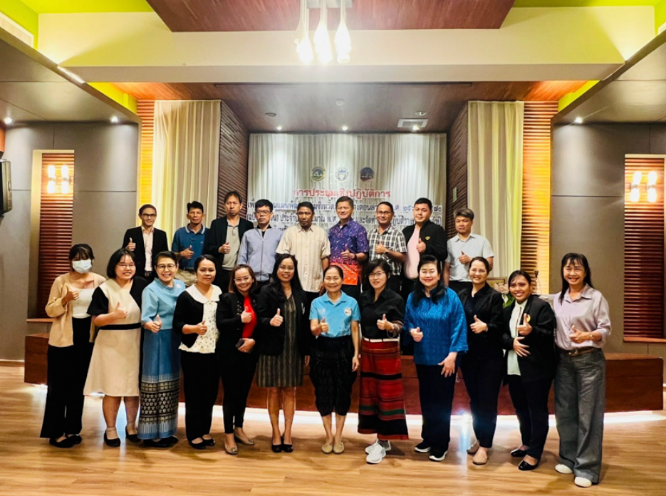
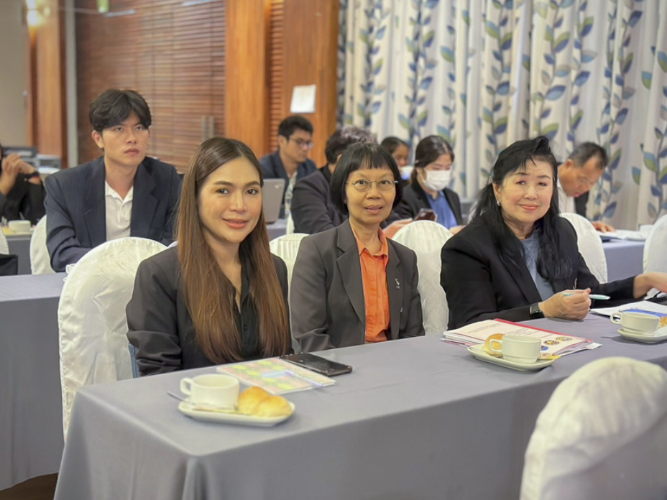
Collaboration with Subdistrict Administrative Organizations and Local Agencies
At the local level, the Suphanburi Campus has worked directly with the Khok Khota Subdistrict Administrative Organization, Mueang Suphanburi District. The Director of the Suphanburi Campus Office participated in the “Meeting to Consider the Additional Local Development Plan (2023–2024), Meeting No. 2/2025,” held at the Khok Khota Subdistrict Administrative Organization meeting room.
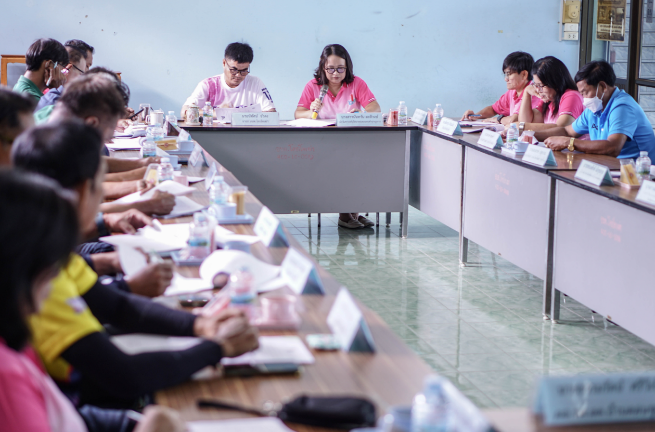
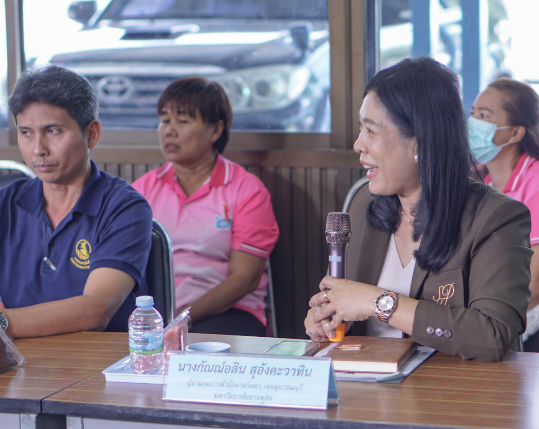
Economic and Social Development in Collaboration with Local Communities
Beyond infrastructure planning, the University has collaborated with the Khok Khota Subdistrict Administrative Organization and Wat Khok Khota to implement the “Khok Khota Community Market” project, aimed at strengthening the local grassroots economy and promoting sustainable community-based commerce. The project was developed through a participatory process between the University and local authorities, with the goal of establishing the market as a venue for community product distribution, a learning space for students, and a recreational area for residents living near the University—guided by the concept of “Community Participation, Sustainable Urban Living, and Economic Growth Rooted in Local Culture.”
The University also provided academic consultation on spatial management, product development, and landscape design, ensuring that the market layout supports daily community life in a way that is organized, safe, and environmentally friendly. This initiative has helped increase household income, support local food security, and create a living environment that enhances overall quality of life. https://suphanburicampus.dusit.ac.th/new/2024/107706/



Linking Provincial Collaboration to the National Level
In addition to local community economic development, Suan Dusit University has expanded its collaborative efforts with local agencies and partners in Suphanburi Province to the policy level through the project “Suphanburi Model: A Prototype City for Safe and Sustainable Food.” This initiative operates under the Hub of Talents in Gastronomy Tourism led by Suan Dusit University, with support from the National Research Council of Thailand (NRCT).
As part of the project, the University organized a public forum to present systematic approaches for urban development rooted in local partnership networks. Participants included academics, government representatives, and community enterprise leaders from Suphanburi, who jointly discussed and proposed strategies for developing the province into a “Safe Food City” with quality standards that are accessible at the community level.


Suan Dusit University and the Expansion of Collaboration with Local Agencies in Other Areas
In addition to its collaboration in Suphanburi Province, Suan Dusit University (Science Center, Bangkok) has expanded its role in urban planning and environmental management through the Office of Science Building Services, which serves as the driving unit for community participation in the development of Bang Phlat District. In 2024, a Memorandum of Understanding (MOU) was signed between the Bang Phlat District Office of the Bangkok Metropolitan Administration, Wat Thong, the Community Participation Steering Committee for Bang Phlat District Development, and West By Delivery Co., Ltd., to support sustainable solid waste management.
This collaboration represents coordinated work with district-level local agencies in Bangkok to plan and develop an integrated urban environmental management system, including waste reduction, source-based waste separation design, and the creation of model community waste management areas. These efforts contribute to a safer, cleaner, and more sustainable living environment for residents in Bang Phlat District.
This reflects Suan Dusit University’s role as an “Urban Policy Partner”, bringing scientific and environmental knowledge to co-design urban development directly with local authorities. It also serves as an example of collaboration with local agencies to address issues related to urban planning and development.

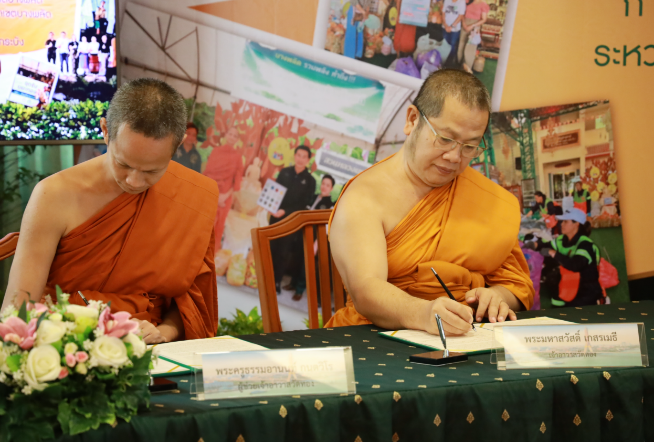
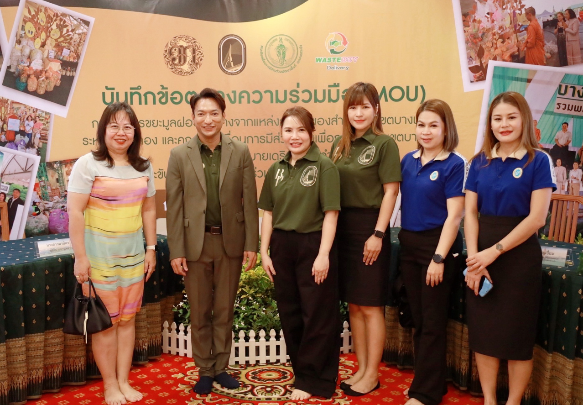

From the case studies in both Suphanburi Province and Bangkok, the role of Suan Dusit University in advancing sustainable urban development can be summarized as follows:
Summary and Policy Outcomes
The continuous work of Suan Dusit University in 2024, both in Suphanburi Province and in Bangkok, demonstrates the University’s clear role as a “Local Development Partner”, collaborating with local authorities at multiple levels to jointly plan and develop urban areas in ways that align with community needs and national sustainable development goals.
The University has shown academic leadership by integrating scientific knowledge, technology, culture, and local wisdom into place-based development, partnering with subdistrict administrative organizations, provincial agencies, the Bangkok Metropolitan Administration, and other stakeholder organizations to advance key issues in urban development, including:
- Urban and community spatial planning and management
- Strengthening local economies and food security
- Sustainable environmental and waste management
- Creating safe, environmentally friendly public spaces that support community well-being
These efforts reflect Suan Dusit University’s vision as a “University for Community,” using knowledge and collaborative capacity to promote balanced, community-centered urban development. This aligns with SDG 11.4.7, which emphasizes collaboration with local authorities in planning and developing cities so that people can access safe and sustainable living environments.
